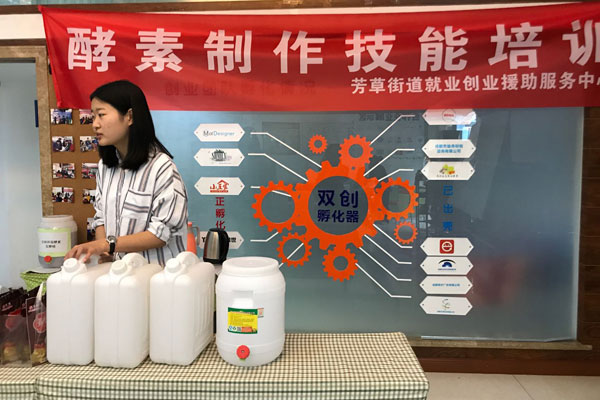 |
|
A student from the Southwest Jiaotong University team shows people how to ferment kitchen waste. [Photo provided to China Daily] |
Innovations
A student team from Chendgu's Southwest Jiaotong University is using biotechnology to process kitchen waste. Fermenting fruit and vegetable matter with brown sugar and water produces an enzyme that functions as an eco-friendly detergent. The team shortened the process from three months to eight days in March 2017.
"We read studies on how microorganisms can accelerate enzyme production," 21-year-old biology major Tian Jiazi says.
"So, we decided to test it in the lab."
The group has handed out about 850 samples of the detergent to residential communities over the past year, 20-year-old team leader Liu Xiaowen says.
They also installed two processing centers in two neighborhoods with a combined population of about 2,000 in February.
The team provided equipment and materials, such as 10 20-liter fermentation buckets, brown sugar and pre-measured doses of microbes.
Residents are encouraged to trade their food waste for detergent. Nearly 100 households have done so far, Liu says.
But Tian says the so-called eco-enzyme is "not all-powerful". However, introducing it to households can at least teach people about separating their kitchen waste from other trash.
Sorting reduces urban solid-waste incineration's toxic emissions, a 2007 Zhejiang University study says.
Kitchen waste comprises an estimated 60 percent of urban solid waste in China, compared with 25 percent in the United States, Tsinghua University School of Environment professor Liu Jianguo says.
China's urban solid waste is typically treated by landfills and incineration, Ministry of Housing and Urban-Rural Development data show.
Composting is eco-friendly but often not viable in densely populated cities like Beijing and Shanghai.
US households often install garbage-disposal units in their sinks that shred food waste into pieces small enough to run through the sewer system.
Such units need to be tested before they could perhaps be widely used in China because of the capabilities of the country's sewers and the fact Chinese food is often greasier than US fare, Liu believes.
Liu encourages every household to filter out the liquid before discarding kitchen waste.
"Getting rid of the fluids reduces waste and minimizes contamination during incineration," he explains.